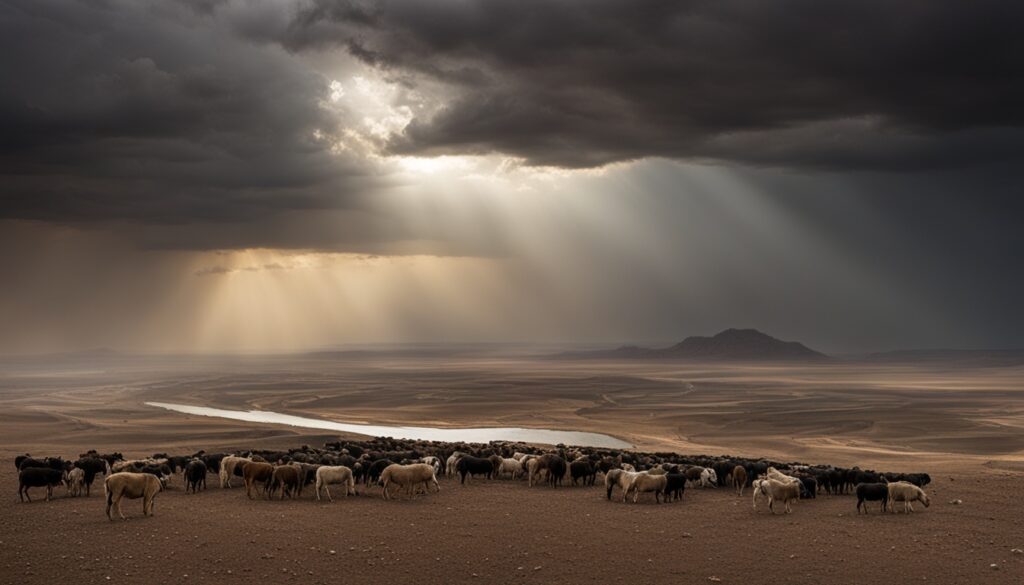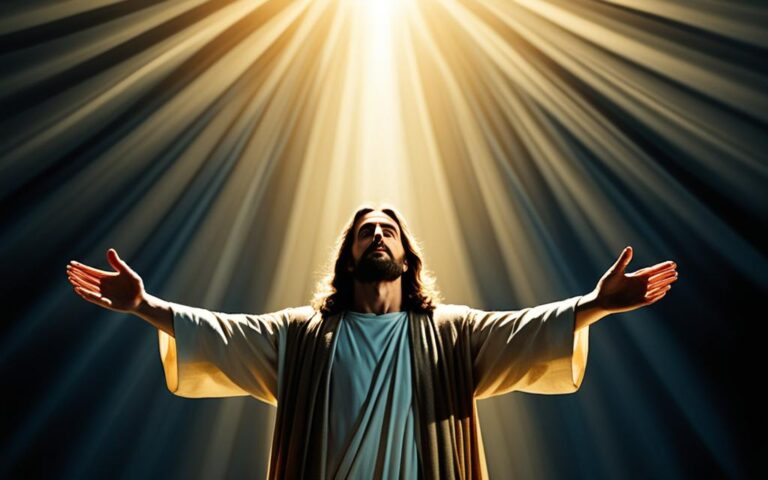The Plagues of Egypt: God’s Power Revealed
Have you ever wondered why the Plagues of Egypt are such a captivating and significant part of the biblical narrative? These ten devastating disasters, described in the book of Exodus 7-12, reveal the immense power of God and his unwavering commitment to delivering the Israelites from the oppression they had endured for centuries. But what deeper insights can we gain by exploring this profound display of divine authority? Let’s dive into the awe-inspiring story and uncover the true purpose behind these miraculous events.
When God sent Moses to free the Israelites from their bondage in Egypt, he promised to showcase his wonders as a testament to Moses’ authority. This divine demonstration served two crucial purposes: to reaffirm the Israelites’ faith in the God of their fathers and to make the Egyptians recognize the true power of the Almighty. After centuries of enslavement, the Israelites had begun to doubt their ability to break free, but God was about to prove that he could shatter even the most formidable chains of oppression.
While the Egyptians worshiped a pantheon of nature-gods, believing these deities controlled the forces of the natural world, Pharaoh himself scoffed at the notion of the Lord’s authority. This defiant attitude set the stage for an epic showdown between the false gods of Egypt and the one true God of the Israelites. The Plagues of Egypt would serve as a dramatic demonstration of God’s power and a clear declaration of his sovereignty over all creation.
As we delve deeper into this captivating narrative, we must ask ourselves: What can the Plagues of Egypt teach us about the nature of God and his relationship with his people? The answers to this question can profoundly shape our understanding of divine power, human faith, and the eternal struggle between good and evil. Prepare to be amazed as we uncover the true meaning behind this awe-inspiring display of God’s might.
The Showdown: God vs. Pharaoh’s Gods
As the God’s power revealed in the plagues of Egypt Exodus 7:17 narrative unfolds, we witness a remarkable showdown between the Almighty and the false gods of Egypt. This chapter, Exodus 7, reveals God’s supreme power and the devolution of that power to Moses, establishing a clear divine authority over the Plagues of Egypt.
Exodus 7: God Establishes His Authority
The clashing of the staffs and Aaron’s rod turning into a snake trumps the illusory magic of Pharaoh’s sorcerers, underscoring the truth that God’s Power and Miracles are far beyond the capabilities of mortal men. As the key verse Exodus 7:5 states, “And the Egyptians will know that I am the LORD when I stretch out my hand against Egypt and bring the Israelites out of it.”
The Nile Turns to Blood
The first plague, turning the Nile to blood, was a judgment against Apis, the god of the Nile, Isis, goddess of the Nile, and Khnum, guardian of the Nile. The Nile, believed to be the bloodstream of Osiris, who was reborn each year when the river flooded, was devastated. Millions of fish died, and the water became unusable, striking at the heart of Egypt’s daily life and national economy. Pharaoh was told, “By this you will know that I am the LORD” (Exodus 7:17).
In response to Pharaoh’s obduracy, God sends multiple plagues — frogs, gnats, and flies — each one more irritating and disastrous than the previous one, underscoring His control over all aspects of creation. The key verse is Exodus 8:10 — “Then he said, “Tomorrow. “He said, “Be it as you say, so that you may know that there is no one like the LORD our God.”
God’s power revealed in the plagues of Egypt Exodus 7:17
As the biblical account in Exodus unfolds, we witness the remarkable display of God’s power revealed in the plagues of Egypt. These plagues were not merely random occurrences, but rather divine judgments intended to demonstrate God’s power and the futility of the Egyptian gods. Let us delve deeper into the specific plagues that shook the ancient land of Egypt and revealed the miraculous nature of our God.
Plague of Frogs
The second plague, bringing frogs from the Nile, was a judgment against Heqet, the frog-headed goddess of birth. Frogs were thought to be sacred and not to be killed. Yet, God had the frogs invade every part of the homes of the Egyptians, and when the frogs died, their stinking bodies were heaped up in offensive piles all through the land (Exodus 8:13–14). This demonstrated God’s power over even the most revered Egyptian deities.
Plague of Gnats
The third plague, gnats, was a judgment on Set, the god of the desert. Unlike the previous plagues, the magicians were unable to duplicate this one and declared to Pharaoh, “This is the finger of God” (Exodus 8:19). This event clearly showed the supremacy of God’s power over the supposed powers of the Egyptian gods.
Plague of Flies
The fourth plague, flies, was a judgment on Uatchit, the fly god. In this plague, God clearly distinguished between the Israelites and the Egyptians, as no swarms of flies bothered the areas where the Israelites lived (Exodus 8:21–24). This demonstrated God’s power to protect His people, even in the face of such a devastating plague.
Plague on Livestock
The fifth plague, the death of livestock, was a judgment on the goddess Hathor and the god Apis, who were both depicted as cattle. As with the previous plague, God protected His people from the plague, while the cattle of the Egyptians died. God was steadily destroying the economy of Egypt, while showing His ability to protect and provide for those who obeyed Him. Pharaoh even sent investigators (Exodus 9:7) to find out if the Israelites were suffering along with the Egyptians, but the result was a hardening of his heart against the Israelites.

The Unrelenting Plagues Intensify
As the plagues of Egypt continued, the confrontation between God’s power revealed in the plagues of Egypt Exodus 7:17 and the Plagues of Egypt intensified. The God’s Power and Miracles demonstrated through the successive Exodus 7 and Exodus events left no doubt about the supremacy of the God of Israel over the Plagues of Egypt.
Plague of Boils
The sixth plague, boils, was a judgment against several Egyptian gods associated with health and disease, including Sekhmet, Sunu, and Isis. This time, the Bible states that the magicians “could not stand before Moses because of the boils.” Clearly, these religious leaders were powerless against the God of Israel.
Plague of Hail
The seventh plague, Plague of Hail, attacked Nut, the sky goddess; Osiris, the crop fertility god; and Set, the storm god. This hail was unlike any that had been seen before. It was accompanied by a fire that ran along the ground, and everything left out in the open was devastated by the hail and fire. Yet, the children of Israel were miraculously protected, and no hail damaged anything in their lands.
Plague of Locusts
The eighth plague, Plague of Locusts, again focused on Nut, Osiris, and Set. The later crops, wheat and rye, which had survived the hail, were now devoured by the swarms of locusts. There would be no harvest in Egypt that year.
Plague of Darkness
The ninth plague, Plague of Darkness, was aimed at the sun god, Re, who was symbolized by Pharaoh himself. For three days, the land of Egypt was smothered with an unearthly darkness, but the homes of the Israelites had light.
As the Plagues of Egypt continued to demonstrate the God’s Power and Miracles of the God of Israel, the stage was set for the final and most devastating plague, which would lead to the Israelites’ ultimate liberation from their bondage in Egypt.
Conclusion: The Passover and Exodus
The ten plagues inflicted upon Egypt by the power of God were a profound display of divine authority, revealing the might of the Almighty to the Egyptians and the Israelites alike. The final plague, the death of the firstborn males, was a judgment on Isis, the protector of children. In this climactic event, God taught the Israelites a deep spiritual lesson that foreshadowed the salvation found in Christ.
Unlike the previous plagues, which the Israelites survived by virtue of their identity as God’s chosen people, this last plague required an act of faith. God commanded each Israelite family to take an unblemished male lamb, kill it, and smear the blood on the tops and sides of their doorways. The lamb was then to be roasted and eaten that night. Any family that did not follow these instructions would suffer the same fate as the Egyptians – the loss of their firstborn.
When the destroyer passed through the land, the only protection was the blood of the lamb on the door. If the destroyer saw the blood, he would “pass over” that house and leave it untouched. This is the origin of the term “Passover,” a memorial of the night when God delivered His people from bondage in Egypt. The New Testament teaches that Jesus became our Passover, shedding His blood to deliver us from the bondage of sin.
While the Israelites were protected by the blood of the lamb, every other home in Egypt experienced God’s wrath as their loved ones perished. This devastating event finally caused Pharaoh to release the Israelites, and they began their exodus from the land of their captivity. The Plagues of Egypt stand as a testimony to the power of God, who will go to great lengths to deliver His people and demonstrate His sovereignty over all creation.







